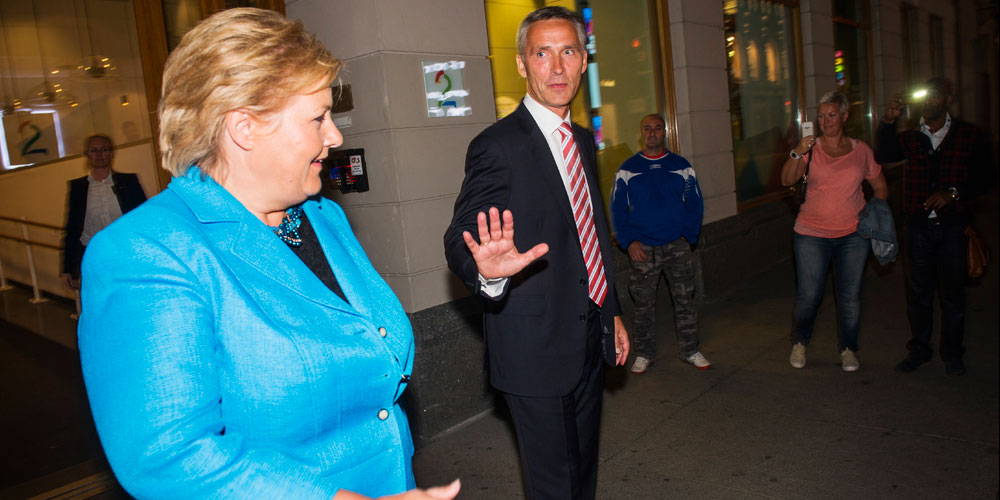
Norway`s Prime Minister Jens Stoltenberg , right, and main opposition leader Erna Solberg leave the building after an appearance in a TV show in Oslo Sunday night, Sept. 8, 2013. Solberg, 52, is the nation’s next prime minister, based on early projections on Monday. AP PHOTO /FREDRIK VARFJELL, NTB SCANPIX
OSLO—Norway shifted right in elections Monday, setting the stage for a new Conservative-led government with the anti-immigrant Progress Party, two years after Muslim-hating Anders Behring Breivik’s deadly rampage.
Early projections reported by the government’s statistical office immediately after voting ended at 9 p.m. (1900 GMT) showed the four parties on the center-right winning 93 of the 169 seats in parliament.
According to the same projections, the center-left coalition led by incumbent Prime Minister Jens Stoltenberg, in power since 2005, won 75 seats, while an extreme leftist party garnered one seat.
The most often-cited scenario is a minority government made up of the Conservatives and the Progress Party. The smaller Christian Democrats and the Liberals would not be in the government due to disagreements with the populist right, but would provide backing in parliament to pass legislation.
Based on this scenario, Conservative Party leader Erna Solberg, 52, is the nation’s next prime minister.
Solberg’s victory comes in spite of the fact that the oil-rich nation has fared exceptionally well under Stoltenberg, also the leader of the Labor Party.
“The country is doing pretty well, but that’s because of the oil, not because of the leaders,” said a 29-year-old voter as he emerged from exercising his democratic right at Oslo’s city hall.
Having cast his ballot in favor of the Progress Party, he added: “It’s time to get a new government”.
Stoltenberg’s two consecutive terms mark an unusually long tenure, even in politically stable Norway.
During this period, he has steered the nation through Europe’s worst post-war economic crisis, warding off any threat to Norway’s very high standard of living.
“Even if many things are going well, there are always many things that could go even better,” Stoltenberg told the TV2 news network earlier Monday.
Significantly, one of the top election issues was the proper use of Norway’s oil fund, which at $750 billion (570 billion euros) is the world’s largest sovereign wealth fund.
Given the general material wealth, and the lack of any serious discontent in society, the weak showing of Stoltenberg’s coalition is mostly put down to power fatigue.
“Norway is one of the richest countries in the world, if not the richest, but the generation who made the nation what it is today is not getting to harvest the fruits,” said retiree Espen Ek, who added he had voted “for change.”
Stoltenberg’s coalition was also criticized for the authorities’ failure to prevent Breivik’s July 22, 2011, attacks. The xenophobic extremist killed 77 people when he set off a van bomb at the foot of the government offices in Oslo before opening fire on a Labor youth camp on nearby Utoeya island.
In an ironic twist, the right-wing’s victory is expected to open the door for the Progress Party to join government for the first time in its 40-year history.
The party, which counted Breivik among its members until 2006, has condemned the attacks and has also toned down its rhetoric on immigrants, of which Norway received 70,000 last year, including 25,000 non-Europeans.
No one in Norway associates the party with the carnage wrought by the right-wing extremist—an issue that has been conspicuous by its absence from the campaign.
Instead, the issues that dominated the run-up to the election were healthcare, education, taxes and what to do with Norway’s vast oil wealth.
The Progress Party, led by Siv Jensen, received 30 seats according to the early projections, down by 11 seats from the last election in 2009.
It was unclear if Stoltenberg would immediately concede defeat.
The Aftenposten daily and other local media reported that Stoltenberg would probably postpone any final announcement until after it was clear if the Conservatives would be able to form a government.—Peter Harmsen